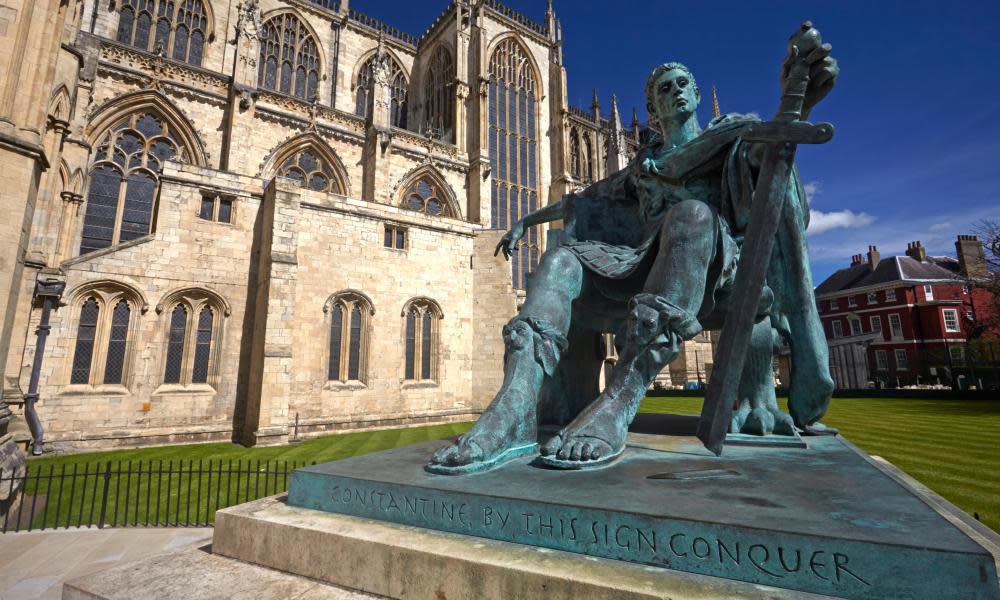Emperor Constantine's statue and the culture war that wasn't

Sprawled on a throne, sword in hand, the statue of Constantine the Great is a familiar fixture outside York Minster. The city claims a connection to the first Roman emperor to establish the Christian faith across Europe. It was in York that Constantine is believed to have succeeded his father to rule the Roman Empire in 306AD. And it was here last week that reports that his life-size bronze could be torn down were considered a threat to civilisation itself.
York Minster had received complaints that the emperor supported slavery, claimed the Daily Telegraph, and that Black Lives Matter protests had led to the statue being put under review. The story was followed up by the Daily Mail and the news was shared thousands of times online accompanied by ridicule and fury.
“Stop capitulating to these ridiculous demands”, tweeted comedy writer Andrew Doyle. “Pathetic”, wrote Welsh assembly member Neil Hamilton. If a classical Roman statue, albeit one erected in 1998, could become an alleged target for destruction, what would come next?
Except one awkward fact persisted: it turns out the story simply wasn’t true. There had been no such complaints to York Minster. The statue is not under review. The Black Lives Matter movement had no active part to play in a debate that appears to have been speculatively confected.
“Contrary to what has been reported, we have not received a single complaint about Emperor Constantine’s statue,” said a York Minster spokesperson, adding: “We are not removing Emperor Constantine’s statue. Nothing is happening: there is no discussion, action, intention or even thoughts about it.”
The imaginary statue scandal comes amid a heated culture war that goes from Donald Trump at Mount Rushmore railing against “cancel culture” on Friday to Ashfield’s Tory MP suggesting that a local statue of a miner was under threat. Statues have become a national obsession, dominating radio talkshows and generating many more hysterical column inches than is proportionate to any real-world risk to them.
The internet massively over-amplifies polarisation on these questions
Sunder Katwala
In an attempt to stop the false narrative spreading, Sunder Katwala, the director of thinktank British Future, repeatedly corrected those sharing the Constantine story online. “The sheer made-upness of it gave people pause,” he told the Observer. “The internet massively over-amplifies polarisation on these questions. And it creates a sense in newsrooms, in political offices, that there are these two tribes that are absolutely at loggerheads – but we’ve done lots of research and work on history and identity and what people think about, and there just isn’t an appetite for these issues.”
He said that the rightwing press often complained, “but if [they] don’t want these culture wars, why are [they] inventing them?”
Historian Tom Holland is also sceptical. “Iconoclasm polarises people; it expresses the worst fears of those who don’t want to see symbols of the past brought down and it becomes a summons to battle,” he said. To Holland, the false fight for Constantine was “a lockdown distraction” for those taking part.
Following the toppling last month of Bristol’s statue of the slave trader Edward Colston, the Church of England has asked cathedrals and churches to review their monuments and statues for specific examples which symbolise and reflect prejudices experienced by people today. “The transatlantic slave trade is the most prominent example and has a contemporary manifestation,” said the York Minster spokesperson. “Constantine and the Romans do not fall into this category.”
Polling by Hope Not Hate last week revealed that 67% of the British public felt attacks on statues and war memorials was “political correctness gone mad” but overall, there was strong public support for the aims of Black Lives Matter protests and 64% agreed that black and Asian people face discrimination in their everyday lives.
To Katwala, the framing of Black Lives Matter online plays to “a strategic advantage from the right in inventing a culture war … This government can either deliver on people wanting a sense of pride in their town, the high street, jobs, spreading the economy – all the things Boris Johnson has been saying – or it can increase the profile of something [it doesn’t] agree with Keir Starmer and David Lammy on.” The net result is that nuance is lost, the broader issues are ignored and only the loudest, rather than the most representative, voices get heard.
As for York, the emperor remains victorious. The Telegraph’s social and religious affairs editor, Gabriella Swerling, declined to comment on her story. A spokesperson for the paper said: “Our journalist spoke to both York Minster and the York Civic Trust and the story we believe accurately reflects these conversations.”


